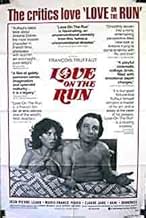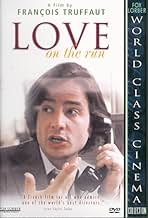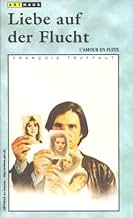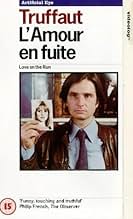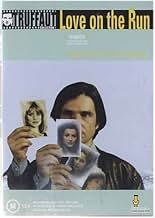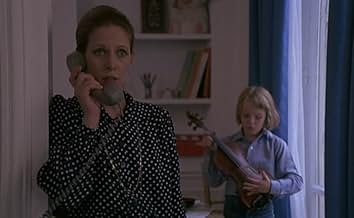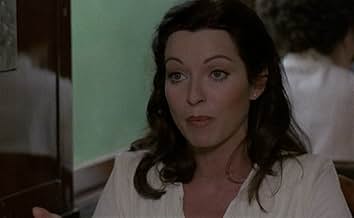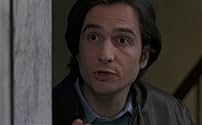Antoine Doinel is now more than thirty. He divorces from Christine. He is a proofreader, and is in love with Sabine, a record seller. Colette, his teenager love, is now a lawyer. She buys An... Read allAntoine Doinel is now more than thirty. He divorces from Christine. He is a proofreader, and is in love with Sabine, a record seller. Colette, his teenager love, is now a lawyer. She buys Antoine's first published autobiographical novel. They meet again in a station...Antoine Doinel is now more than thirty. He divorces from Christine. He is a proofreader, and is in love with Sabine, a record seller. Colette, his teenager love, is now a lawyer. She buys Antoine's first published autobiographical novel. They meet again in a station...
- Awards
- 1 win & 1 nomination total
- Antoine Doinel
- (as Jean-Pierre Leaud)
- Sabine Barnérias
- (as Dorothee)
Featured reviews
This last part from 1978 shows us Doinel doing what he's also doing in the previous four parts - falling in love with numerous women, trying to keep up relationships, looking for love, flirting etc. While the first part from 1959 showed us Doinel's childhood in a poor family with a hard and beating father and his longing for respect and love, the following parts are less interesting in my opinion.
The final chapter is rather superfluous, with jokes falling flat, no real script, no suspense or a really interesting story line, and the actors are just running around most of the time. If you have watched the previous Doinel films it might be interesting to see this sequel (which is not really an end), but I suggest you to watch the first Doinel movie "Les 400 coups" ("The 400 Blows") instead, or Truffauts "L'homme qui l'amait les femmes" ("The Man Who Loved Women"), a far more interesting study on love, obsession and fetishism.
We continue to observe the trials and tribulations that life presents to the often frustrated Antoine, with multiple flashbacks to previous presentations forming a significant part of the piece, you really need to be a fan of the series in order to appreciate the journey, the saga, the voyage, of the boy become man but still a boy. There's a good chance you can pick out numerous events that may align with your own passage, or from someone you know, which may escalate your appreciation. While an enjoyable piece, it does seem to have run its course, and left with more of a whimper than a whoop.
Here, all the women of Doinel's life appears together and now he has a chance to figure out why his relationships simply doesn't work. Recently divorced of Christine (Claude Jade), and involved with no good terms with Sabine, Doinel meets again Colette (Marie-France Pisier), his first love and they share some secrets, remember some moments when they two met for the first time, and both characters discover more things about each other, about life and about love.
At the trivia section is mentioned that Truffaut thought about making a huge mistake while filming this sequel, and I think he shouldn't be ashamed of it. It isn't much of a film since half of it it's flashbacks taken from all of Doinel's films plus a few moments of "Le Nuit Americaine" included as an interesting subplot of Doinel's romantic affairs (even though he plays a different character in that film). Compared to the other movies of the series this is less comical, a little bit too serious and it's more focused on how the kid that seems to never grow finally realizes what love really is than his amusing and funny life experiences as a working man.
But seeing all the flashbacks, those memorable moments covering 20 years of a person is breathtaking, refreshing, unique in all motion picture history. We can look back and see how much Antoine/Léaud changed through these years and some of us practically saw him growing up and I bet Truffaut must have loved this experience, seeing someone he could relate with and share some of his own experiences and see them portrayed on screen. One of the most touching moments of "Love on the Run" is the reunion between Doinel and the lover of his mother, whom he haven't seen in years, and the way they talk about the past, we see scenes from "The 400 Blows" when Doinel was a kid and saw him with his mother, and he hated the guy for it, then few years later they are happy to see each other, a bond between Doinel's troubled life and his life while a grown up man.
Most of the reviews on this classic are very superficial here. "Love on the Run" is a memorable, delightful and magic experience through great moments of one of the most interesting, inspiring and charming characters of all time, and this is his goodbye to us, always striving, always fighting, always believing in something and always managing to get what he wants even though we as audience might think he'll be lost forever. Doinel echoes a part of us that never should die: our youth. 10/10
This particular stylistic device does set up a sense of familiarity for new viewers, however; with such a slight plot, the flashbacks end up becoming the most interesting part of the movie, with what little new footage there is so repetitive that it feels like you're watching the same scene over and over again. In fact, the film is so hastily put together that it looks like Truffaut is desperate to get the series finished and out of the way, so that he can finally move on with the more progressive work that he was attempting with films like The Green Room (1979) and The Last Metro (1980).
Still, the film can sometimes be charming and the actors are all on fine form, but the whole thing seems lacking somewhat; with the use of repeated imagery and scenes cut and pasted from the previous films making this feel too much like a retread rather than a radical re-interpretation. For me, the film just seems empty, deflated and somehow lacking the allure, beauty and sophistication that was always synonymous with Truffaut's work or at least the films of his that I am familiar with. For me, Love on the Run was something of a slight, disappointing and unimaginative film that failed to inspire me in the way I had initially hoped.
Did you know
- TriviaThe flashback of Liliane and Antoine arguing is, in fact, a clip from Day for Night (1973), in which both also played lovers despite the film not being part of Antoine Doinel saga.
- GoofsAccording to her grave, Antoine Doinel's Mother, Gilberte, died in 1971. According to the conversation Antoine has with her ex-lover five minutes before, she died in 1968 (while Antoine was in the army, in the beginning of "Baisers Volés").
- Quotes
[English subtitled version]
Antoine Doinel: [to Alphonse as he is about to head off to music camp] If you practice hard, you'll be a great musician.
Alphonse Doinel: What if I don't?
Antoine Doinel: If you don't, you'll wind up a music critic.
- Crazy creditsDuring the opening credits, when the "Screenplay" ("Scenario de") credit appears on the screen, in the background a faded white "X" appears for a frame; also, there is a clapper on the left-hand side of the screen (for several seconds) before being pulled off screen.
- How long is Love on the Run?Powered by Alexa
Details
- Release date
- Country of origin
- Language
- Also known as
- Liebe auf der Flucht
- Filming locations
- Rue des Anglais, Paris 5, Paris, France(record shop)
- Production company
- See more company credits at IMDbPro
Box office
- Gross US & Canada
- $509
- Opening weekend US & Canada
- $11,206
- Apr 25, 1999
- Gross worldwide
- $509
- Runtime
- 1h 34m(94 min)
- Color
- Sound mix
- Aspect ratio
- 1.66 : 1

![Watch Bande-annonce [OV]](https://m.media-amazon.com/images/M/MV5BZmU4NzU4Y2EtODg1ZS00NmVjLTlhOTItYWY2YmE0NTdlMDlhXkEyXkFqcGdeQXRyYW5zY29kZS13b3JrZmxvdw@@._V1_QL75_UX500_CR0)
